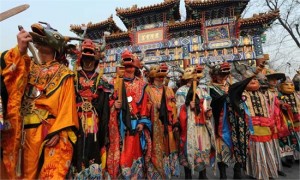After my last post about People’s Daily, at least one reader asked me via email why I bother posting about articles in the Chinese media that rail against the West, since they are so consistently preposterous. And the reader has a point. These columns from People’s Daily and Global Times and China Daily tend to repeat the same tiresome theme, namely that the West is determined to make China look bad, to undermine the CCP, to somehow harm China. These memes become ingrained in the Chinese psyche (not across the board, of course) and are echoed in countless blog posts and comments and message boards. I know entire blogs (or at least one) that seem to focus solely on this theme of China’s victimization.
So why bother? First of all, being a media junkie I find the explosive responses infinitely fascinating, I admit. More importantly, I believe contemporary China can’t really be understood without having insight into this phenomenon, without understanding the raw sensitivities of so many Chinese people (especially the young). I had to deal with this mentality on a daily basis when I was living in China. My young colleagues truly believed Anti-CNN was gospel, and that the US media, in partnership with the US government, actively conspired to defame China and make it look atrocious, with the ultimate goal of stymieing China’s growth and keeping it weak and under the control of its former imperialist masters. This sentiment is real.
Which is all a long way to build up to today’s atrocity from People’s Daily, highlighted in a most interesting piece in the NY Times. Looking at it today, I saw another reason why documenting these stories is important: they reflect a growing hostility and brazenness that has deep implications for China’s future relations with the West.
You all know by now about Google’s new charges against alleged Chinese hackers breaking into gmail accounts of activists, foreign officials and other high-profile users. People’s Daily, in a front-page editorial under the headline, “Google, What Do You Want?” responded with savagery:
“Many international bystanders believe that Google’s charge is thickly tainted with political colors, and one can’t dismiss the fact that Google is taking advantage and provoking new Sino-American Internet security disputes with sinister intentions. Today’s Google really makes one wring one’s hands. What was once a model of leading Internet innovation has now become a political tool for slandering other countries.”
….Once the international winds change, Google might become a political sacrifice and might be discarded by the market.”
[I’d love to ask them who those “many international bystanders” are. I can only think of only one who might step forward to hump the CCP’s leg.]
Needless to say, revenge against Google was swift.
In the days after Google’s latest accusation, Chinese users of Gmail and the popular Google Maps service have seen connections slow to a crawl, while the same services accessed over private networks have remained trouble-free.
Chinese officials have attributed Google’s service problems to technical issues that do not involve the government, and they have denied any government role in hacking Google computers or e-mail accounts.
Google had little to gain by making these accusations. It has already seen its market share trounced by Baidu, especially since its accusations against Chinese hackers last year, and I think they’ve been resigned for a long time to being number two (or lower) when it comes to Chinese search. As the NYT article says, however, they’re making their profits in China from advertising, with revenues growing year over year and a staff of 500. I see no reason why Google would make these accusations if they weren’t fairly certain they were true. At this point, what’s in it for them? Was the Chinese government behind the attacks? I don’t think anyone can say for sure, but there is certainly plenty of circumstantial evidence (just look at the list of those who’ve had their gmail accounts hacked).
As one Washington Post commentator maintained today, this is actually a non-story. Everyone knows what Chinese hackers are up to:
The big surprise: This story made front-page news.
Hackers in China, who most security experts believe work for the Chinese government, have been whacking away at Gmail accounts of Chinese citizens for years and have previously hacked into accounts of prominent U.S. journalists and businesspeople working in the Middle Kingdom
It’s pretty much an open secret. Every correspondent in China knows it. And yet whenever it’s brought to light the Chinese media goes into paroxysms of rage and finger-pointing, to the extent of accusing Google of trying to sabotage US-Chinese relations. This is what amazes me and is why I bother to write this sort of thing up: it’s the sheer vitriol of China’s reaction, dripping with veiled threats, and their need to put this on the front page of their newspapers. The lady doth protest far too much, methinks.
This post is a bit all over the place, but I think you get my point.



Comments